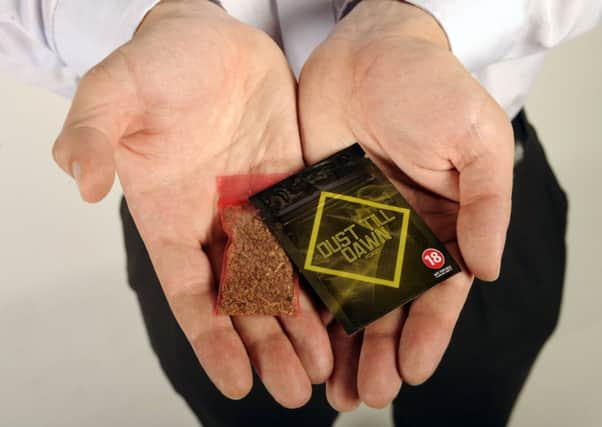‘Legal highs’ face UK Government review


The review will look at how the UK’s laws and enforcement against new psychoactive substances, also known as legal highs, can be improved.
Options to be considered will include widening legislation to ensure police and law enforcement agencies have better-tailored powers.
Advertisement
Hide AdAdvertisement
Hide AdThe move comes as the Government announces that two new groups of psychoactive substances - NBOMe and Benzofury - will become classified as Class A and B drugs respectively.
Crime prevention minister Norman Baker said: “The coalition Government is determined to clamp down on the reckless trade in so-called legal highs, which has tragically already claimed the lives of far too many young people in our country.
“Despite being marketed as legal alternatives to banned drugs, users cannot be sure of what they contain and the impact they will have on their health. Nor can they even be sure that they are legal.
“Our review will consider how current legislation can be better tailored to enable the police and law enforcement officers to combat this dangerous trade and ensure those involved in breaking the law are brought to justice.
“NBOMe and Benzofury are drugs which have caused serious harm and in some cases death to those who have taken them. Outlawing them is crucial in the battle to restrict their supply and use.”
Banned
NBOMe and benzofuran compounds are currently under a temporary banning order, which will become permanent when legislation is passed next year.
The Advisory Council on the Misuse of Drugs (ACMD) last month recommended both substances are banned permanently.
The review will be led by the Home Office, with input from experts in law enforcement, science, health and academia and will present its findings in spring 2014.
Advertisement
Hide AdAdvertisement
Hide AdThe Home Office has also published updated guidance for local government on the different action trading standards can take against shops selling new psychoactive substances.
Ten “legal highs” were identified last year for the first time in the UK by a specialist Government system that targets music festivals and tobacco shops.
A total of 27 new psychoactive substances, also known as legal highs, have now been detected by the Home Office’s Forensic Early Warning System since it was set up in January 2011.
Official figures also show that the number of deaths being linked to legal highs soared by 80% last year to 52, from 29 in 2011.
Martin Barnes, chief executive of DrugScope, a charity supporting professionals working in drug and alcohol treatment, said: “It has been clear for some time that the law has been unable to keep pace with the chemistry when it comes to the production and supply of new drugs.
“As DrugScope’s recent Street Drug Trends Survey highlighted, in some areas so-called ‘legal highs’ are not only being sold online and in ‘headshops’, but in outlets such as newsagents, petrol stations and take-away food shops.
“This is an attempt by the Home Office to bolster current enforcement efforts and to see what other legislative options could be brought to bear on this new and complex drug situation.
“However, it is important to remember that the law by itself cannot bring this trade under control.
Advertisement
Hide AdAdvertisement
Hide Ad“It is vital that education and information efforts are significantly enhanced in order to make the public - especially young people - more aware of the risks posed by experimenting with substances of unknown content and origin. These substances are not labelled ‘research chemicals’ by sellers for nothing.”
Hundreds of thousands
Shadow crime and security minister Diana Johnson said: “The Home Secretary came into office promising ‘swift action’ on legal highs. Three years later she is launching a review.
“In the meantime hundreds of substances have come on to the UK market and thousands of sellers have opened up.
“While the Government have failed to act, hundreds of thousands of young people have been trying these drugs, and sadly this has often had fatal consequences.
“While the Home Secretary has been burying her head in the sand, local authorities across the country have been trying to close down the high street shops selling these drugs but they have consistently been thwarted by hopelessly out of date legislation, which allows sellers to pretend that these drugs are research chemicals.
“Instead of telling local authorities what the law is, the Government should be updating it.”
In July, Labour proposed an amendment to Anti-Social Behaviour Bill to enable successful prosecutions of shops selling legal highs.
Ms Johnson added: “If the Government was serious about helping to close down these shops they’d back our amendment in the Lords in January.”